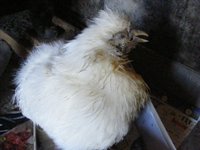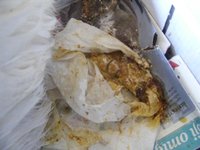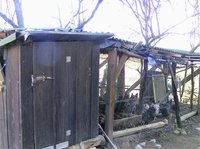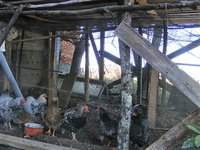- Mar 15, 2016
- 49
- 38
- 94
Hi all,
We lost quite a few chickens this year and a few years ago to something that might be a recurring disease. Lately, our last little Silkie hen was mildly sick for a few months, but getting worse in the last 10 days. I browsed other topics but didn't find anything that would quite fit, so I'm posting this just in chance somebody might help.
First time a similar thing happened was 4 ys ago when we had a very rainy autumn, and it seems to come back when we have a prolonged period of wet weather (not necessarily cold, because our summer was very rainy this time). It seems to spread, but quite slowly. With older (adolescent) chickens, like few years ago, about each week or two one would start acting weaker, usually coughing, gurgly breath, stretching its neck upwards and opening its beak, and would get weaker and weaker until it died, after a few weeks. No bloody poop or other symptoms.
With young chicks, like we had this summer, it was much faster - about every other day one of them would just start looking weak - they didn't even cough or have any other symptoms - breath sounded ok, no discharge, no blood from vent, normal poop, everything looked normal from outside except weakness - but within a night or two they would be dead. I'm not even sure it's the same disease except that it seems to be encouraged by prolonged wet weather, and it spreads slowly. We lost a lot of smaller chicks this year (1 - 3 months), but some survived and adults didn't seem to be affected.
We gave them antibiotics a few times - something that is supposed to fight coccidiosis and also saved some chicks with respiratory problems last year. But this time it didn't help at all. Our chickens free range most days, but trying to keep them closed for a while didn't help either. I put a terrarium heather where they were sleeping, but it didn't make a difference.
Now this young Silkie was one of the summer survivors (and the only Silkie to survive - we had 5). But she started acting a bit weaker and coughing in October, so we kept her in the house, and would let her out only in warmer days. She was stable, but coughing a bit and rather sleepy and very calm for quite a few weeks, then around New Year seemed to feel better and for 2 days spent a few hours outside foraging with other chickens. But after that, she suddenly got worse - she started coughing and sneezing much more, looking weaker, and 10 days ago she had 2 days of strong bleeding from her vent (mostly during the nights). Not just bloody poop - more like period bleeding, without any obvious reason. After 2 days, that stopped, thankfully.
Of course, after that she was a lot weaker. She still wants to eat, but last 5 days either her neck is stiff, or she has problems with coordination, because she keeps pecking, but rarely succeeds in picking up food. It gives me some hope that she still wants to eat, but I'm not very hopeful. She still lifts her head with every breath and coughs and sneezes often.
We gave her 2 types of antibiotic and some deworming powder, but nothing made a difference. Last few days her eyes are mostly closed with (mostly clear) pus, there is some nasal discharge and unpleasant smell. We give her milk mixed with egg yolk and vitamins to drink, and she is eager enough to drink, but very weak so we have to help her. I think without that she'd be dead by now. I'm quite awed, actually, that she's still alive. Quite a little fighter.
Except for those 2 days of vent bleeding and willingness to eat and drink, this seems pretty much the same as whatever killed our first flock of adolescent Wyandottes 4 ys ago. At that time, we also had some adult mongrels, who looked a bit sick for a week or so, but recovered without long term consequences. Our chickens free range, and their coop is built on bare ground rather than concrete flooring, so it's difficult to sanitize.
I read about CRD (chronic respiratory disease), mycoplasma, and choryza, but the symptoms don't quite fit. Infectious bronchitis seems the closest, but I'd expect it to spread faster through the flock.
Any thoughts?
We lost quite a few chickens this year and a few years ago to something that might be a recurring disease. Lately, our last little Silkie hen was mildly sick for a few months, but getting worse in the last 10 days. I browsed other topics but didn't find anything that would quite fit, so I'm posting this just in chance somebody might help.
First time a similar thing happened was 4 ys ago when we had a very rainy autumn, and it seems to come back when we have a prolonged period of wet weather (not necessarily cold, because our summer was very rainy this time). It seems to spread, but quite slowly. With older (adolescent) chickens, like few years ago, about each week or two one would start acting weaker, usually coughing, gurgly breath, stretching its neck upwards and opening its beak, and would get weaker and weaker until it died, after a few weeks. No bloody poop or other symptoms.
With young chicks, like we had this summer, it was much faster - about every other day one of them would just start looking weak - they didn't even cough or have any other symptoms - breath sounded ok, no discharge, no blood from vent, normal poop, everything looked normal from outside except weakness - but within a night or two they would be dead. I'm not even sure it's the same disease except that it seems to be encouraged by prolonged wet weather, and it spreads slowly. We lost a lot of smaller chicks this year (1 - 3 months), but some survived and adults didn't seem to be affected.
We gave them antibiotics a few times - something that is supposed to fight coccidiosis and also saved some chicks with respiratory problems last year. But this time it didn't help at all. Our chickens free range most days, but trying to keep them closed for a while didn't help either. I put a terrarium heather where they were sleeping, but it didn't make a difference.
Now this young Silkie was one of the summer survivors (and the only Silkie to survive - we had 5). But she started acting a bit weaker and coughing in October, so we kept her in the house, and would let her out only in warmer days. She was stable, but coughing a bit and rather sleepy and very calm for quite a few weeks, then around New Year seemed to feel better and for 2 days spent a few hours outside foraging with other chickens. But after that, she suddenly got worse - she started coughing and sneezing much more, looking weaker, and 10 days ago she had 2 days of strong bleeding from her vent (mostly during the nights). Not just bloody poop - more like period bleeding, without any obvious reason. After 2 days, that stopped, thankfully.
Of course, after that she was a lot weaker. She still wants to eat, but last 5 days either her neck is stiff, or she has problems with coordination, because she keeps pecking, but rarely succeeds in picking up food. It gives me some hope that she still wants to eat, but I'm not very hopeful. She still lifts her head with every breath and coughs and sneezes often.
We gave her 2 types of antibiotic and some deworming powder, but nothing made a difference. Last few days her eyes are mostly closed with (mostly clear) pus, there is some nasal discharge and unpleasant smell. We give her milk mixed with egg yolk and vitamins to drink, and she is eager enough to drink, but very weak so we have to help her. I think without that she'd be dead by now. I'm quite awed, actually, that she's still alive. Quite a little fighter.
Except for those 2 days of vent bleeding and willingness to eat and drink, this seems pretty much the same as whatever killed our first flock of adolescent Wyandottes 4 ys ago. At that time, we also had some adult mongrels, who looked a bit sick for a week or so, but recovered without long term consequences. Our chickens free range, and their coop is built on bare ground rather than concrete flooring, so it's difficult to sanitize.
I read about CRD (chronic respiratory disease), mycoplasma, and choryza, but the symptoms don't quite fit. Infectious bronchitis seems the closest, but I'd expect it to spread faster through the flock.
Any thoughts?







